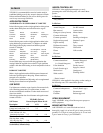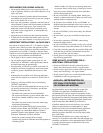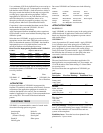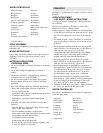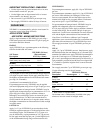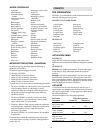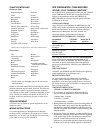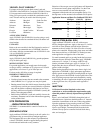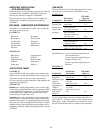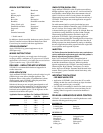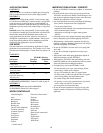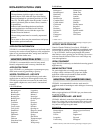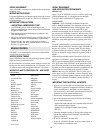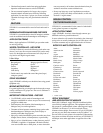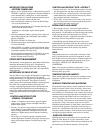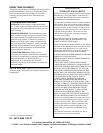
BRUSH SUPPRESSION
* Partial control
In addition to brush controlled, herbaceous species listed in
Weeds Controlled section of Release-Herbaceous Weed
Control may be controlled with these applications.
SPRAY EQUIPMENT
Apply VELPAR L by ground equipment or by air
(helicopter only).
MIXING INSTRUCTIONS
For ground application, use enough water for thorough
coverage, usually a minimum of 25 gal per acre. For aerial
applications, use at least 5 gal of water per acre and at least
5 gal of water for every 1 gal of VELPAR L.
RELEASE - UNDILUTED APPLICATIONS
VELPAR L is recommended for hardwood suppression in
conifer release sites.
GRID APPLICATION
Apply undiluted VELPAR L directly to the soil surface in a grid
pattern using an exact delivery handgun applicator. This
equipment delivers a thin stream of a predetermined volume
when triggered. Apply VELPAR L during the period from
hardwood bud break to early summer.
Selection of the rate per acre and grid pattern depends on soil
texture and woody plant composition. Use the lower rates on
coarse textured soils and when the major component of the
hardwoods are susceptible species. Use the high rates on fine-
textured soils and hard-to-kill species.
Application Patterns and Rates For Undiluted VELPAR L
ML/Spot Grid (Ft) Qt/Acre
Coarse 0.5 3 X 4 2*
1.2 3 X 6 3
2.1 4 X 6 4
Medium/Fine 1.2 3 X 3 6
2.3 3 X 6 6
1.6 3 X 3 8
3.1 3 X 6 8
* Use on deep sands with pines four years or more of age.
SINGLE STEM (BASAL SOIL)
Apply undiluted VELPAR L to the soil with an exact delivery
handgun applicator. Apply at the rate of 2–4 ml for each inch of
stem diameter at breast height. Direct the treatment to the soil
within 3 ft of the root collar of woody plants to be controlled.
When treating large stems and when more than one delivery of
VELPAR L is needed per stem, make application on opposite
sides of the stem.
For multi-stemmed and low-growing brush that have stem
diameters that are difficult to determine, apply VELPAR L at the
rate of 2–4 ml per 3ft of canopy width. For tall, slender
(columnar) brush types, apply 4–8 ml per 3ft of height. Base rate
on whichever canopy dimension is greater (width or height).
When treating brush that requires more than a single 4 ml
application of VELPAR L, apply subsequent applications
equally spaced around the plant. If treating brush on sloped sites,
apply most of the VELPAR L on the uphill side of the stem. If
treating resprouts from brush disturbed by cutting or shredding,
the rate of application should be proportional to the original tree
size, not just the small regrowth of sprouts.
INJECTION
No Worker Protection Standard worker entry restrictions or
worker notification requirements apply when this product is
directly injected into agricultural plants.
Inject 1 ml of undiluted VELPAR L through the bark of
undesirable trees. Injections should be made at 4" intervals
around the circumference of the tree. When using tubular
injection equipment, inject VELPAR L near the ground level.
When using the “Hypo-Hatchet” Tree Injector or a similar
devise, inject at waist height. Treatment should be made in the
summer. Woody species controlled include black cherry, oaks,
and sweetgum.
IMPORTANT PRECAUTIONS
- RELEASE UNDILUTED
• Application of VELPAR L spots closer than 36" to conifer
seedlings in their first season or directly up slope from these
seedlings may result in injury or mortality.
• Use VELPAR L on seedlings in their first or fourth year and
older. Injury may result from use on two and three year old
seedlings where root growth is extensive but hardiness is
lacking.
RELEASE- HERBACEOUS WEED CONTROL
VELPAR L is recommended for controlling herbaceous weeds
where the following species are grown:
EASTERN US
WESTERN US
Blue spruce
Douglas fir
Engleman spruce
Grand fir
Jeffrey pine
Lodgepole pine
Noble fir
Ponderosa pine
Sitka spruce
White fir
Loblolly pine
Longleaf pine
Red pine
Slash pine
Ash
Aspen
Balsam poplar
Birch
Box elder
Brambles
Cherry (black, pin)
Deerbrush ceanothus
Dogwood*
Elm
Greenleaf manzanita
Hawthorne
Hazel
Honeysuckle
Oaks
Red maple*
Snowbush ceanothus
Sumac*
Sweetgum*
Whitehorn
Willow
12



